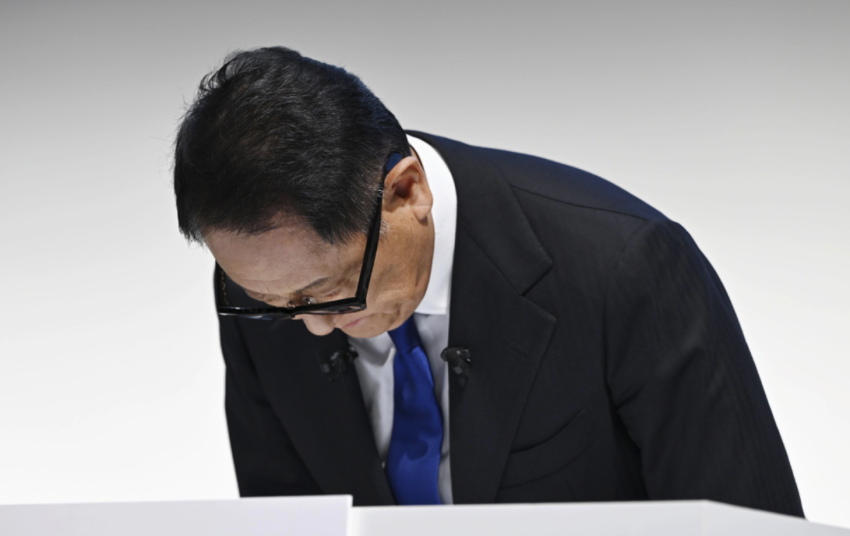Rather than revealing fraud and intentional deception, the latest test scandal to strike Japan's automakers has instead shown the rules governing the process are not fit for purpose, leaving Japan Inc. to suffer an entirely self-inflicted PR disaster.
Regulators said Toyota Motor Corp., Honda Motor Co., Mazda Motor Corp., Suzuki Motor Corp. and Yamaha Motor Co. did not fully follow government standards in testing a total of 38 models for certification, of which six currently on the market initially became subject to a suspension of shipments.
But about 70 percent of the affected models -- all Toyotas or Hondas -- were put through more stringent tests than required. Toyota said it was looking to meet overseas market standards, which meant it went above and beyond what Japan expects.
But for Japanese authorities, the automakers were guilty of not following the rules to the letter -- what is expected even if the companies believed they were doing more than required.
Toyota said Friday it will take necessary measures according to the regulators' instructions after it reported the final result of its in-house probe into its certification process to the transport ministry.
The situation sparked calls for an overhaul of the testing rules due to the 73-year-old regulations being too inflexible and overly complicated. Auto analysts also pointed to the issue of automakers needing an excessive lead time of around a year to obtain certification for mass production.
Yuzuru Ohashi, managing partner at the Japanese unit of German consulting firm Roland Berger, says the current certification system is "outdated" and the government "should update it in collaboration with Japanese manufacturers."
A review is inevitable because cars have advanced so far since the early 1950s when the tests were first formulated, with vehicles now connected, autonomous, shared and electrified, analysts said, not to mention having much-improved tire, brake and safety technology.
"Technologies always precede regulations," said Ken Shiraishi, a professor at Tokyo Metropolitan University who specializes in compliance issues.
The industry and the regulators should work more closely also to address the misunderstandings of the rules, some analysts and industry observers said.
"The problem is that there has been a serious lack of communication between the regulatory side and the private sector," said Shiraishi.
The certification tests are designed to ensure each model meets government safety and environmental standards so there is no need for inspections of each vehicle.
"I hope this whole thing will lead automakers and the government to work together to examine whether any change is needed in the (certification) system," Toyota Chairman Akio Toyoda said at a press conference in early June, though he said he is not in a position to make such a proposal given his company's wrongdoing.
Among its test irregularities, Toyota said it used an 1,800-kilogram moving barrier for a rear-end collision test of the Crown sedan and the Sienta minivan, much heavier than the required 1,100 kg barrier.
"Automakers are doing business globally. It will be a lot simpler if the Japanese rules are the strictest so that we can vouch for vehicle quality in other markets," Toyoda said.
Automakers are under increasing pressure to develop a wider range of vehicle types more efficiently across different markets, analysts said.
If they can reduce the number of certification tests, it should help them roll out new models more swiftly and in response to market demand, they said.
Honda said it conducted noise tests on 22 models that were more strict than required, using heavier vehicles that exceeded legal ranges but reporting the weights were within the correct standards. Honda said vehicle noise becomes louder when the car is heavier.
"Our employees conducted those tests under a wrong assumption that if they were carried out under the worst possible conditions, they would automatically meet the standards," Honda chief executive Toshihiro Mibe said at a press conference in early June. "It was not done with malicious motives."
Still, automakers must comply with regulatory requirements no matter how stringent they believe their tests are, as stricter tests do not necessarily guarantee vehicle safety, analysts said.
"There could be some room for improvement in the certification system" to relieve automakers of the burden of conducting different tests for different markets, said a senior executive at a foreign automaker in Japan.
Among key tests set up by the Ministry of Land, Infrastructure, Transport and Tourism, 43 items such as tests to check brakes and seatbelts are based on U.N. regulations that are adopted in the European Union and 60 other countries but not in the world's two biggest auto markets, the United States and China.
Only four items related to windshield wipers and vehicle interiors, among other components, are Japan-specific, according to the ministry.
An official in charge of the certification process at the transport ministry said it is open to any suggestion to improve the system.
Given road conditions, accidents and traffic flows are much different in the United States compared to Japan and Europe, test results from what the automakers call "tougher conditions" may not directly translate into safer outcomes in all markets, the official added.
Masahiro Fukuda, chief analyst at auto research firm Fourin Inc. said the real cause of the scandal was a lack of communication between regulators and automakers.
"If automakers wanted to do tests in other ways, they should have negotiated with the authorities beforehand," he said. "That's the biggest problem here."

























